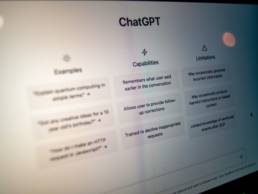ChatGPT has been making waves with its advanced conversational capabilities. If you have questions, we've got answers.

ChatGPT, powered by AI technology, is a natural language processing tool that enables you to engage in human-like conversations and so much more with the chatbot. This language model can provide you with answers to your queries and help you with various tasks. These range from writing emails, and essays, to coding.
In fact, the paragraph above is written by ChatGPT…
Currently, ChatGPT is in its research and feedback-collection phase hence why it is still free of charge. However, a premium version called ChatGPT Plus has been introduced in early February. It requires a paid subscription to access its more advanced features. You can access it by simply visiting chat.openai.com and creating an OpenAI account. After signing in to your account, you can start chatting with ChatGPT right away by asking a question.
Who created ChatGPT?
ChatGPT was created by OpenAI, an artificial intelligence research laboratory consisting of the for-profit corporation OpenAI LP and its parent company, the non-profit OpenAI Inc.
Is it really that much of a big deal?
ChatGPT is considered a big deal because it represents a significant advancement in natural language processing and artificial intelligence technology. With its large-scale training and sophisticated neural network architecture, ChatGPT can generate human-like responses to a wide range of prompts. It is one of the most advanced language models available today. This technology has many potential applications, from customer service chatbots to virtual assistants and even creative writing assistance. ChatGPT’s development and open-source availability have made it accessible to a wider range of developers and researchers.
Why are people concerned about ChatGPT?
Some people are worried about ChatGPT because of its potential to generate highly convincing fake text, which could be used for malicious purposes such as spreading false information, impersonating people, or even committing fraud. Additionally, there are concerns about privacy and data security, as the language model may have access to personal information. However, efforts are being made to address these concerns and ensure that ChatGPT is developed and used responsibly.
Others also fear AI chatbots will replace or atrophy human intelligence. For example, the chatbot can write an article on any topic efficiently (though not necessarily accurately) within seconds, potentially eliminating the need for a human writer.

The chatbot can also write an entire full essay within seconds, which people fear will make it easier for students and children to cheat at school and avoid learning skills such as writing. This has led to some school districts blocking access to it.
The bot itself says: “Some people may be concerned about the potential impact of AI technology. including language models like myself, on the workforce, education, and other areas of society. AI technology has the potential to automate certain jobs, and it can also be used for purposes such as cheating in school or creating convincing fake text. However, it is important to note that AI is still a tool developed and used by humans, and its use and development are subject to ethical and social considerations. It is up to us as a society to ensure that we use AI in responsible and beneficial ways that serve the common good.”
Are there other AI chat services similar to ChatGPT?
Yes, there are several AI chat services that are similar to ChatGPT. These include IBM Watson Assistant, Microsoft Bot Framework, Google Dialogflow, Amazon Lex and Pandorabots. Each of these services offers a unique feature and capabilities.


Are there other AI chat services similar to ChatGPT?
The future of ChatGPT is promising, as it is one of the most advanced natural language processing tools available. Its creators at OpenAI are continuously working to improve its capabilities and expand its potential applications. As technology advances, ChatGPT may be able to perform even more complex tasks and interact with humans in more sophisticated ways. In the long term, it is possible that ChatGPT and other similar AI chat services may become more integrated into our daily lives. Thus potentially changing the way we interact with technology and each other.
Scary or exciting? Time will tell.

